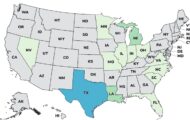The deadly Listeria monocytogenes outbreak that has killed three people in Kansas has been linked to Blue Bell ice cream. When most people think of food poisoning, they think of undercooked or raw meat or eggs. How does a supposedly innocuous product like ice cream become contaminated with pathogenic bacteria? Listeria monocytogenes bacteria are everywhere in our environment. These bacteria live in soil and water. Animals carry the bacteria and can transfer it to our food though feces, through dirty irrigation water, and in food harvesting and transport. All bacteria love food because it's a great source of nutrients. Listeria monocytogenes bacteria are unique in that they can grow at refrigerator and even freezer temperatures. In fact, the longer a food contaminated with this … [Read more...]
How Does Listeria Get Into Ice Cream?
FDA: Blue Bell Ice Cream Linked to Listeria Outbreak Made in Texas
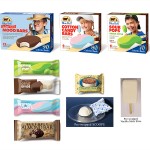
Rare strains of Listeria cultured from five patients at Via Christi hospital in Wichita were also found in several flavors of ice cream made at Blue Bell Creameries' Brenham, Texas facility, according to the U.S. Food and Drug Administration (FDA). Between January 2014 and January 2015, Listeria sickened five Via Christi patients who ate Blue Bell ice cream they were served while hospitalized for unrelated illnesses. Three of them died. Cultures from the five patients revealed four rare strains of Listeria. Three of the strains were highly similar to one another. During routine testing at a South Carolina distribution center on February 12, the South Carolina Department of Health & Environmental Control found seven strains of Listeria in ice cream products made at Blue … [Read more...]
CDC Updates Caramel Apple Listeria Monocytogenes Outbreak

The Centers for Disease Control and Prevention (CDC) have updated the outbreak of Listeria monocytogenes infections linked to commercially produced, prepackaged caramel apples made from Bidart Brothers apples. The outbreak appears to be over, but the recalled products may still be in consumers' homes. Even if you froze these products, discard them, since Listeria can grow at freezer temperatures. In all, 35 people in 12 states were sickened in this outbreak. There were seven deaths and 34 hospitalizations. Listeriosis contributed to at least three of the seven deaths. Eleven illnesses were pregnancy-related; one illness resulted in a fetal loss. Three children developed Listeria meningitis, a serious complication of this infection. In addition, two people in Canada were sickened with … [Read more...]
Oasis Cheese Listeria Outbreak Sickened Five in 2014
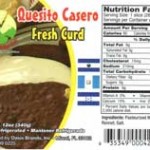
Listeria outbreaks are often linked to soft cheese, usually made by small facilities. The 2014 outbreak associated with Oasis Brands soft cheeses and the current outbreak linked to Queseria Bendita soft cheeses are two cases in point. There are several reasons for these outbreaks: small vendors may not have the experience or training to understand the risks inherent in making their product. These cheeses have higher pH than aged cheese and a high moisture content, which makes them quite susceptible to contamination. And third, Listeria monocytogenes bacteria is everywhere and it is hardy, growing at refrigerator temperatures and quite difficult to kill. The outbreak in 2014 was never definitely linked to Oasis brand cheeses, but Listeria strains isolated from quesito casero cheese … [Read more...]
Queseria Bendita Listeria Soft Cheese Recall Updated
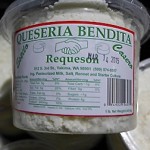
The recall of Queseria Bendita soft cheeses and sour cream for Listeria monocytogenes contamination has been updated to include ALL best by dates. Previously, all products with best by dates up to 4/16/15 were recalled. There is an outbreak associated with this recall; three people in Washington state were sickened with listeriosis. Two people were hospitalized, and one person died. One illness was associated with a pregnancy. The recalled products are packaged in clear plastic wrappers or plastic tubs, and the best by dates are stamp coded next to a label. The cheeses and sour cream have shelf lives of up to 90 days. The last date of distribution was January 15, 2015. That means consumers probably still have them in their homes. All best by dates are recalled. The recalled … [Read more...]
Queseria Bendita Cheese Listeria Outbreak Highlights Past Recalls

The current outbreak of listeriosis linked to recalled Queseria Bendita soft cheeses is a reminder that these types of foods have often been recalled for Listeria monocytogenes contamination in the past. In the current outbreak, three people in Washington state have been sickened and one person has died. Over the past three years, there have been at least 25 recalls of soft cheese for Listeria monocytogenes in the U.S. and 9 recalls in Canada for the same reason. And there have been recalls of hard cheeses for Listeria too. Cheese is particularly vulnerable to Listeria contamination for a few reasons. Any cheese, whether hard or soft, made with raw or unpasteurized milk has a much higher risk of contamination, since Listeria bacteria are present in the farm environment. In fact, … [Read more...]
How Does Listeria Get into Soft Cheeses?

The current Listeria monocytogenes outbreak linked to recalled Queseria Bendita soft cheeses (and sour cream) has sickened three people and killed one person in Washington state. Soft cheeses are not recommended as part of a pregnancy diet, along with deli meats and unpasteurized milk for this reason. But why are soft cheeses a Listeria risk? First of all, any soft cheese made with unpasteurized milk is a risky food. Raw milk can, and does, contain many pathogenic bacteria from E. coli to Campylobacter to Listeria monocytogenes. The FDA developed a draft assessment on the risk of consumers contracting listeriosis from soft cheeses in 2013. They found that soft cheese made from unpasteurized milk has a risk of containing Listeria bacteria 50 to 160 mites higher than soft cheeses made … [Read more...]
Genetic Link Between Bidart Brothers Apple Facility, Listeria Outbreak

Since December 22, 2014, consumers have been told not to consume any commercially prepared, prepackaged caramel apples because of a Listeria monocytogenes outbreak associated with those products. As the investigation unfolded, it became clear that Bidart Brothers, an apple packer in California, was the only grower to apply apples to Happy Apple Company and Merb's Candies, two recalled brands. Also on December 22, 2014, Bidart Brothers issued a recall of Granny Smith apples sold to customers who make caramel apples. That recall was expanded on December 24, 2014, to all Bidart Brothers caramel apple-making customers supplied with Granny Smith apples in 2014. The California Food Emergency Response Team was sent on December 23, 2014 to investigate the outbreak. Environmental samples were … [Read more...]
CDC Updates Listeria Caramel Apple Outbreak: 7 Dead
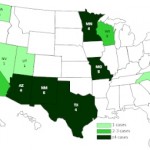
The Centers for Disease Control and Prevention (CDC) has updated the investigation into the Listeria monocytogenes outbreak linked to commercially produced, prepackaged caramel apples. As of January 10, 2015, 32 people in 11 states are sickened in this outbreak; 31 people have been hospitalized, three have Listeria meningitis, and seven people have died. Listeriosis contributed to at least three of these deaths. It's not clear whether or not a Listeria infection contributed to the newly reported death. The case count remains the same as the last update on December 31, 2014, but one more person has died. The case count by state is: Arizona (4), California (2), Minnesota (4), Missouri (5), Nevada (1), New Mexico (6), North Carolina (1), Texas (4), Utah (1), Washington (1), and … [Read more...]
Listeria Found at Bidart Brothers Apple Plant: Recall Issued
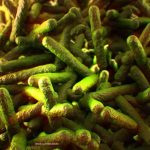
The FDA announced the results of tests performed on samples taken from Bidart Brothers apple processing plant. Government officials confirmed that two strains of Listeria monocytogenes found at the facility are believed to be the same strains associated with the Listeria outbreak that has sickened at least 32 people in 11 states. Those same strains were found in Bidart Brothers apples collected by the FDA from a retailer. The company has issued a voluntary recall of all Bidart Brothers Granny Smith and Gala apples still available in the marketplace. The company last shipped Granny Smith apples to customers on December 2, 2014. Consumers should not eat the Granny Smith and Gala apples being recalled. The apples are sold under brand names "Big B" and "Granny's Best", though they could … [Read more...]




